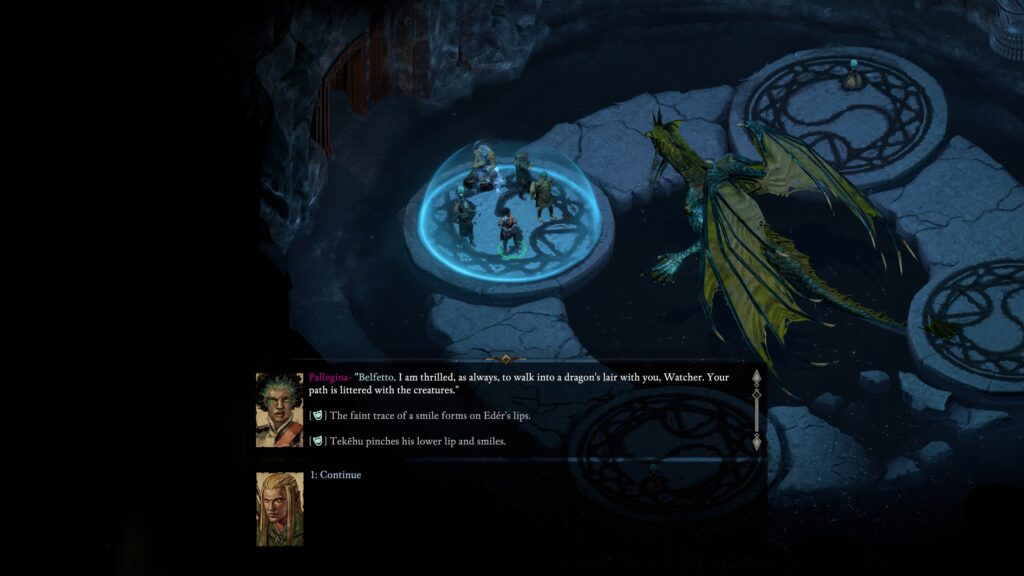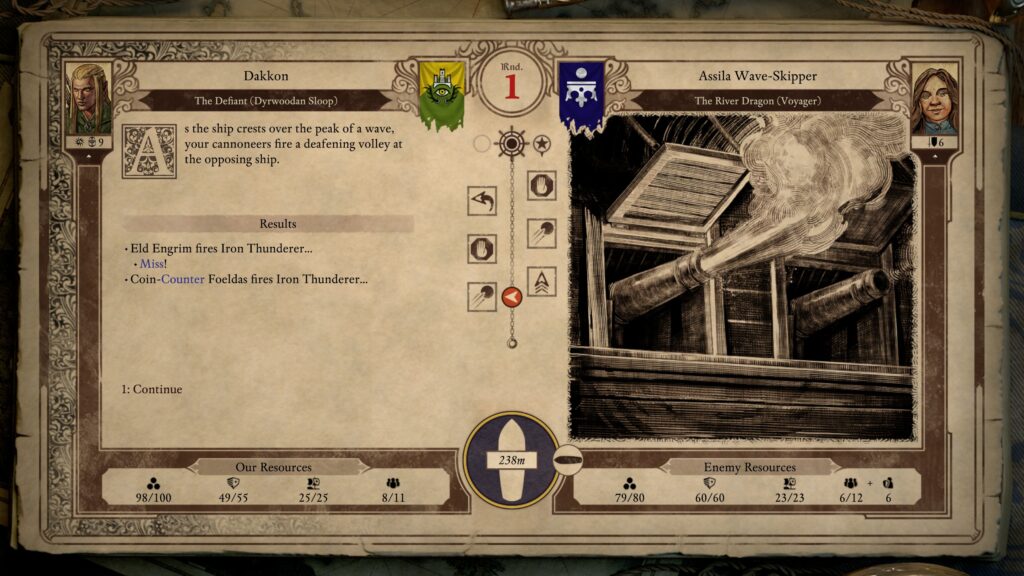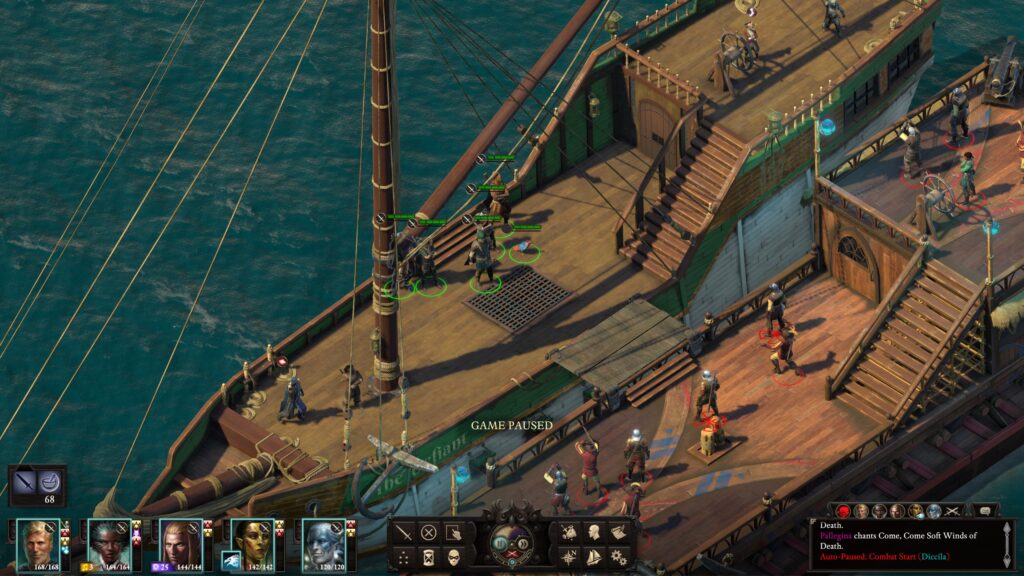
Despite my gripes, I did like the first game enough that I would eventually play this so now I have. There are so many things that are similar and so many that are different that it’s hard to decide where to start. I will note that like the first game this was quite a high-profile release but it’s still noticeably not an AAA-quality. It actually feels a little short for the epic scale that it is going for and there are all kinds of shortcuts in the writing and mechanics. Still it’s a solid party-based RPG and I suppose some compromises have to be accepted for it to even exist.
You ostensibly play as the same character from the first game with the plot hook being that your keep of Caed Nua is destroyed by the god Eothas possessing and animating the giant adra statue under it. Eothas then travels to the Deadfire Archipelago while you are unconscious due to the attack. Your surviving allies buy a ship to follow Eothas in and the god Berath charges you to learn what Eothas is up to. You arrive at the Deadfire to find its islands a battleground between the competing factions including the native Huana civilization, the Vailian Trading Company, the Royal Deadfire Company of Rauatai Empire and the pirates of the Príncipi sen Patrena. Meanwhile Eothas is walking between the concentrations of adra in the Deadfire, seemingly absorbing the power for some unknown goal while also sucking the souls of anyone nearby. Eothas’ actions naturally threaten everyone’s interests and the various factions ask for your help. But they also want you to act against the other factions on their behalf, deciding who will be the dominant power in the Deadfire after you deal with Eothas one way or another.

There are quite a few changes in the mechanics, many of which relate directly what I talked about the last time around. Party size is reduced from six to five, but you do get multiclassing so that’s kind of a wash. You also have subclasses to further customize characters. An injuries system replaces the previous stamina, a good change that I believe comes from the Tyranny game. Guns have been nerfed somewhat and penalizes your defense when used in melee, which is fair. There are now plenty of per encounter abilities that you can use more freely and you can further use per rest abilities to empower your characters as needed. Being mindful of the time I spent playing Pathfinder: Kingmaker, I opted to use real time with pause mode and the second highest difficulty level. I remembered that the first game was actually quite challenging but barring the very earliest parts before you gather a full party, this isn’t the case here. The battles are mostly rather straightforward given a well-built party at the appropriate power level and I hardly ever needed to use the at rest-limited abilities at all.
The biggest difference however is the nautical setting. You’re given a sailing ship of your own right from the beginning and use it as your mobile base of operations as you travel throughout the Deadfire. The ship has slots to upgrade its sails, cannons, steering wheel and so on and of course you can change the entire ship later. You also have to hire sailors to fill out the different crew positions but will have to pay them wages and provide them with food and drink. The idea is that you want to do this because there are naval battles in the game and pirating other ships is a good source of money. The turn-based naval combat system is quite neat at first but you’ll soon realize that they play out exactly the same every time. Also you can simply choose to board the enemy ship to engage in normal combat if you want and that’s usually far easier and faster. As far as I can tell, there is no need to worry about maneuvering your ship to get close enough to the enemy to board it until the very final battle, so whether or not you want to play the whole naval game is entirely up to you.

Story-wise, I really like how the prevailing theme here is colonization. The Huana are the native civilization of the Deadfire but their inferior technology and military means that they are not strong enough to completely keep out the Vailian Trading Company and the Royal Deadfire Company. The Vailians want to establish trading networks and mine the islands for adra deposits. The Ruatai is imperialistic and actually want to absorb the Deadfire into their empire, while the pirates of the Principe want the archipelago to be their playground to plunder as they wish. Yet the Huana aren’t exactly a utopia when left to their own devices. They are a caste-based society and their lowest caste is oppressed by their warrior class. The inability of their rulers to change and innovate is what contributed to them being outmatched by the trading companies and there are Huana settlements that willingly cooperate with the outsiders. Naturally there are more complications, in how factions within the Principe and the Vailians are willing to deal in slaves and how the Ruatai use violence and assassinations to pursue their objectives. It’s a setting that is rife with story possibilities.
In practice, this promise doesn’t quite pan out as this is still video game quality writing and the various questlines are too short to really flesh out the subtleties of the theme. The endgame forces you to make a hard choice between the various factions and there’s no real way for you to reshape the possible choices with your prior actions. Like any other RPG, your prior successes just build reputation but the at the end, the options you get are still the same, unpalatable ones. It’s also annoying that there is no thematic link between the conflict in the Deadfire with the main questline about pursuing Eothas. The other gods make a lot of noise and try various schemes without your input to stop Eothas but in the end, nothing you do can alter Eothas’ course of action. Ideally, the gods and Eothas should be watching what you are doing with the various factions and reacting accordingly as Eothas believes that the fate of mortals should be in their own hands while some of the other gods believe that the mortals require guidance from the gods. But this game just isn’t that sophisticated and so it’s all just background flavor.

Anyway I do like the game well enough. The combat is satisfying and I appreciated how they made an effort to do away with too much filler combat this time around. They may even have overcompensated as I was able to get out of a lot of fights through story choices and using out of combat skills. I did like there is only one big fight at each level effectively. If you start shit, you eventually make enough noise to draw in every enemy on the level, which makes sense and is very cool. Still I think they tried to make up for the fewer sidequests and possibility of not enough combat by putting in a lot of bounty quests. They’re simply go there, kill that person and come back. There really are a lot of those and it’s kind of silly that this has no story impact at all. You’d think that a faction that you are trying to befriend would take offense in you killing some of their officers. Or that Maia, a companion whose personal story is about her involvement in morally shady missions, would react. But no, this is a video game where everything is compartmentalized and you don’t want to block the player off from whole swathes of content.
I started out being pumped for this game as the combat feels decently good and building your party and your ship seems satisfying. But I must admit that my interest waned as it went on as the limitations of a less-than-AAA budget became ever more apparent. It wouldn’t be as grating if the game felt less ambitious, but the epic-seeming plot involving gods and the fate of the world just promises so much. In the end, the posturing and bloviating of the gods is just hot air and promised Ukaizo is just underwhelming. It’s not a bad game but it’s not epic enough for what it is trying to do. I also think that I played this because I still instinctively feel that I ought to play every party-based RPG that comes along. I now realize that I don’t have to and I really ought to be more selective. Barring a true AAA game like Dragon Age 4 or some other game that truly surprises, I think I’m done with the genre for a while.